Redcat’s hospitality IT platform supports multi-site restaurants and franchises to manage their point of sale, online ordering, loyalty program, kitchen management, delivery partners, QR code ordering and virtual brands within a single system.
Redcat’s core value stems from the end-to-end digital ecosystem. The technology gives QSRs a suite of services to run operations effectively. Redcat’s enterprise-level services include:
- Loyalty - Loyalty apps and cards, gift cards and in-store messaging
- Self-service Kiosks – Help bust those queues and improve operational efficiency
- iOS & Android Apps - Drive loyalty, delivery, and online orders
- Paperless Kitchen – Speed up multi-stage production, passing orders from one station to the next
- Delivery - Fixed-cost 3rd party delivery and integration with Uber Eats, Menulog, Deliveroo, Google & DoorDash
- Online Ordering - Web ordering and Mobile App ordering
- Drive Thru – Integrated to POS and kitchen
- Virtual Brands Management - Manage both your Virtual & Physical Brands from a central portal, giving you control over delivery partners, kitchen management, menus and reporting
- Delivery Driver Manager - Display the status of delivery orders on a screen and the drivers mobile via QR code, showing when the order is ready.
- QR Code Table Ordering - Give your customers the convenience of QR code ordering and paying from their table.
Redcat works with multi-site hospitality businesses - Nando’s, Grill’d, Boost Juice, Noodle Box, San Churro and other global brands – supplying their technology needs.
For more information, please visit www.redcat.com.au
5 Tech-Driven Ways to Power Down and Green Up Your QSR

In today's environmentally conscious world, quick-service restaurants (QSRs) are under increasing pressure to reduce their environmental footprint. Fortunately, technology offers a powerful solution to help QSRs achieve their sustainability goals. Let's explore five key ways tech can help you power down and green up your QSR:
1. Digital Receipts: A Greener Choice
By switching from paper to digital receipts, QSRs can significantly reduce their environmental impact. Digital receipts not only save on paper and ink but also reduce the energy consumption associated with printing. This simple change can have a big impact, especially for QSRs with high transaction volumes.
2. Streamlined POS Integrations: Less is More
Many QSRs still rely on separate devices for online and in-store orders. This can lead to inefficiencies and increased energy consumption. By integrating online ordering systems directly into the point-of-sale (POS) system, QSRs can eliminate the need for extra devices, reducing power consumption and simplifying operations.
3. Smart Inventory Management: Waste Not, Want Not
Food waste is a major issue for QSRs, both environmentally and financially. Smart inventory management systems can help QSRs optimize their stock levels, reducing food waste and the energy associated with storing and disposing of excess food. By accurately forecasting demand and automating reordering, these systems can help QSRs operate more efficiently and sustainably.
4. Digital Kitchen Management: A Recipe for Efficiency
Traditional paper-based order slips can lead to errors, delays, and increased waste. Digital kitchen management systems can streamline kitchen operations by sending orders directly to digital displays in the kitchen. This eliminates the need for paper, reduces errors, and improves efficiency. Additionally, these systems can provide valuable data on order patterns and peak times, helping QSRs optimize their staffing and energy usage.
5. Digital Loyalty Programs: A Sustainable Reward
Many loyalty programs rely on physical plastic cards, which can contribute to plastic pollution. By transitioning to digital loyalty programs, QSRs can reduce plastic waste and offer a more convenient and environmentally friendly experience for their customers. Digital loyalty programs can also be used to deliver personalized offers and promotions, enhancing customer engagement and driving repeat business.
By embracing these tech-driven solutions, QSRs can significantly reduce their environmental impact, improve operational efficiency, and enhance the customer experience. It's time to power down and green up your QSR, one innovation at a time.
Other Articles

Top Hospo Tech Trends for 2024

The rise of AI and how it can help hospitality

Concept Eight partners with Redcat to deliver convenience and customer-centricity for QSRs

Maximising digital wallets for customer loyalty

Looking for an IT platform for your QSR? Here are a few tips

Managing order pick-ups for streamlined QSR deliveries

Redcat’s fixed-cost model is transforming QSR deliveries

5 things to consider before building your restaurant’s mobile app

Integrating systems with a trusted partner reaps benefits for QSRs

Fast forward - the top 10 key QSR trends to watch in 2022

The paperless kitchen – how an integrated KMS can streamline operations and enhance customer experience.

3 workforce trends and how QSRs can cash in

5 Pain Points QSRs Face Everyday (and How Redcat Can Help)

Top 6 Emerging QSR Trends To Look Forward To




